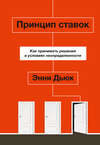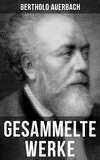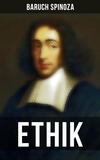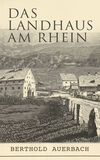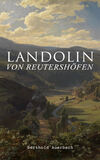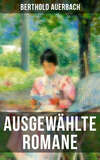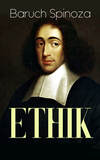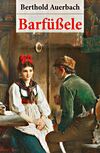Czytaj książkę: «Villa Eden: The Country-House on the Rhine»
"Be patient a few minutes longer! There's a man beckoning to go with us," said the boatman to his passengers.
– Villa Eden, Page 1.
BOOK I
CHAPTER I.
THE APPARITION
"Be patient a few: minutes longer! There's a man beckoning to go with us," said the boatman to his passengers, two women and one man. The man was gray-haired, of slender form, rubicund face, and blue eyes of a kindly, but absent-minded and weary expression; a heavy moustache, wholly covering the upper lip, seemed out of keeping with this inoffensive face. He wore a new summer suit of that fashionable material which seems be-dashed and be-sprinkled with white, as if the wearer had purposely rolled himself in a feather bed. He had, moreover, a pretty wallet attached to a leather belt, and embroidered with blue and red beads.
Opposite the man sat a tall and stately woman, with restless eyes and sharp features, that might once have been attractive. She shook her head, vexed at the delay, like one not accustomed to be kept waiting, got up, and sat down again. She wore a pale-yellow silk dress, and the white veil on her gray round hat was wound about the rim like the band around a turban. Again she threw back her head with a quick movement, then looked straight down before her, as if not to show any interest in the stranger, and boring with the point of her large parasol into the side of the boat.
Near the man sat a smiling, fair maiden, in a blue summer suit, and holding in her hand, by the elastic string, a small blue hat ornamented with a bird's wing. Her head was rather large and heavy, and the broad forehead was made yet more massive by a rich abundance of braided hair; a large curl on each side rested upon her shoulder and breast. The girl's countenance was bright and clear as the clear day which shed its beams over the landscape. She put on her hat, and the mother gave it a little touch to adjust it properly. The girl exchanged quickly her coarse leather gauntlets for delicate, glossy ones which she took out of her pocket; and while drawing them on with great dexterity, she looked at the new-comer.
A tall and handsome young man, with a full brown beard, a sinewy frame, a gray shawl over his shoulder, and upon his head a broad-brimmed gray hat with black crape, same down the steep and zigzag path with a vigorous step to the shore. He stepped into the boat, and lifting his hat while bowing in silence, displayed a noble white forehead shaded by dark-brown hair. His countenance spoke courage and firmness, and, at the same time, had an expression that awakened confidence and trust.
The girl cast down her eyes, while her mother once more fastened and unfastened her hat-string, contriving at the same time, with seeming carelessness, to place one long curl in front, and the other upon the shoulder behind, so as to be becoming, and to look easy and natural.
The man in the mottled suit pressed the white head of his cane to his lips. The stranger, seating himself apart from the others, gazed into the stream, whilst the boat was moving rapidly through the water. They landed at an island on which was a large convent, now a boarding-school for girls.
"Oh, how beautiful! and are the lessons learned there?" asked the girl, pointing to a group of lofty trees on the shore, clustered so near together that they seemed to have grown out of one root, and with low seats inside the grove. "Go on!" said the mother with a reproving look to the girl, and immediately taking her husband's arm. The girl went on before, and the stranger followed them.
In the thickets sang the nightingales, the blackbirds, and the finches, as if they would proclaim, "Here is the peace and the rest of Paradise, and no one disturbs us." The dark fir-trees with their sheltering branches, and the long row of light-green larches stood motionless by the shore, and bees hummed in the blossoming chestnut-trees. They reached the convent. The building, without any architectural peculiarity, had an extended prospect of the garden, the meadows on the island, the river, and the mountains. It was shut up, and no human being was to be seen. The old gentleman pulled the bell; a portress opened a small window, and asked what was wanted. Admission was demanded, but the portress replied that it could not possibly be granted that evening. "Take in my card, and say to the good mother that I am here with my wife and daughter," said the old gentleman. "Permit me to add also my card," said the stranger. The three looked round, struck by the pleasant tone of his voice. The stranger handed his card, and added, "Please say to the worthy Lady Superior, that I bring a message of greeting from my mother."
The portress closed the window quickly, while the four stood at the entrance. "I took you for a Frenchman," said the old gentleman with a kindly tone to the young man. "I am a German," he replied. "Have you then a relative in the convent, and are you acquainted with the good mother?" "No, I know no one here." The answers of the stranger were so short and direct, that he gave no opportunity to continue the conversation, and the old gentleman appeared to be a man of position and character, who was accustomed to be addressed, and not to make advances. He walked with the two ladies towards a beautiful flower-bed, and placed himself with his companions upon a seat. But the girl was restless, and walking up and down along the edge of the meadow, she gathered the hidden violets. The young man remained standing as if rooted to the spot, staring at the stone steps which led up to the cloister-door, as though he must find out what various destinies had already gone in and out over them.
Meanwhile, the old gentleman said to his wife, "That elegant young man appears to me to be a gambler, who has lost all his means at one of the neighboring baths. Who knows but that he wants to borrow money of the Lady Superior?" She laughed at her husband for being disposed to see now, for the third time during this journey, a criminal or a ruined man in the persons they chanced to meet.
"You may be right," said the old gentleman; "but that's the mischief of these showy, establishments, that one supposes everybody he meets has something to do with them. Besides, just as it happened with our daughter – "
"What happened with me?" asked the girl from the meadow. "Why," continued the father, "how often, when walking behind you at the baths, have I heard people say, 'What beautiful false hair!' no one now thinks that there is anything genuine."
The girl laughed merrily to herself, and then adding a violet to the nosegay on her bosom, called out, "And I believe the stranger is a poet." "Why?" asked the mother. "Because a poet must be handsome like him." The old gentleman laughed, and the mother said, "Child, you are manufacturing a poet out of your own imagination; but, silence! let us go, the portress is beckoning to us."
The convent door opened, and the visitors entered. Behind the second grated door stood two nuns in black garments with hempen cords about their waists. The taller nun, an old lady with an extraordinarily large nose, told them that the Lady Superior was sorry not to be able to receive any one; that it was the evening before her birth-day, and she always remained, on that day, alone until sunset; that there was a further difficulty in admitting strangers to-day, as the children – for so she called the pupils – had prepared a spectacle with which to greet the Superior after sun-down; that everything was in disorder to-day, as a stage had been erected in the great dining-hall; that the Superior, however, had ordered that they should be shown over the convent.
The two nuns led the way through the main passage. Their step was hard and noisy, for they wore wooden shoes fastened to the feet by leather straps over the stockings. The smaller and prettier nun, with her delicate features pinched up in the close-fitting cap, had kept herself timidly in the background, allowing the other to do the talking. But now she addressed the girl in the blue muslin dress, speaking in French. The mother gave a nod of satisfaction to the father, as much as to say, "There, now; you see it was worth while to let the child learn something; that was my doing, and you only reluctantly consented." The father could not refrain from informing the nun with the big nose that his daughter, Lina, had returned, only six months before, from the Convent of the "Sacred Heart" at Aix-la-Chapelle. The stranger also spoke a few words in French to the pretty nun. But now, and as often as he addressed her, she drew herself shyly back, apparently not from timidity, but with a nervous involuntary shrinking into herself.
The breakfast-room, school-room, and music-room, and the large dormitories were shown to the strangers, and they admired the neatness and good order everywhere seen. Especially in the sleeping-rooms everything was arranged as prettily and neatly, as if not real human beings, much less careless children, inhabited them, but as if everything had been made ready for fairy visitants. In one little bed only was there any disturbance. Lina drew back the curtain, and a child with great brown eyes looked up. The young man had also come to the bedside. "What is the matter with the child?" asked Lina. "Only homesickness." "Only homesickness," said the stranger in a low tone to himself, while the lady asked, "How do you cure homesickness?" "The housekeeper has a sure method; a child complaining of homesickness is put on the sick-list, and must stay in bed; when she is allowed to get up, the homesickness is gone, and she feels at home." "Go away, all of you! go away! I want Manna, I want Manna," moaned the child. "She will come soon," said the nun, soothingly, adding in explanation, "No one but an American girl can pacify the child." "That must be our Manna," said Lina to her mother. The twilight was gathering, and through the galleries, in the golden evening light, strange forms rustled in long green, blue, and red garments, and then vanished within the cells.
The visitors went into the dining-room, at the farther end of which there was the representation of a forest scene with a hermitage; and there lay a doe bound with a red cord. The young creature fixed its great eyes on the strangers, and tugging at its cord, tried to get away.
The French nun said that the children, aided by one of the sisters who had a natural talent that way, had themselves arranged the decorations. Large choirs had been practicing, and one of the pupils, a very remarkable child, had composed the piece which represented a scene from the life of the Superior's patron saint.
The German nun regretted that no stranger could be present. A copy of the song to be introduced in the play was lying upon a chair. The lady, taking it up, read it and handed it over to the young man, who ran through the verses. "It's astonishing that a child should have composed them," said the lady. The young stranger felt obliged to make some reply, and observed in a somewhat careless tone, "Our German language, especially when used in rhyming, is an instrument that can easily be drummed upon, and thrummed upon, by any child."
"I told you so; he is a poet," said the triumphant look of the girl to her parents.
As they were leaving the dining-hall, now turned into a temporary theatre, Lina remarked to the pretty Frenchwoman how sorry she was not to be able to see her young friend, Hermanna Sonnenkamp; she herself was obliged to return that very evening with her parents, as they had been invited to attend, to-morrow afternoon, a reception at the Countess von Wolfsgarten's.
The girl said this with a proud emphasis, as if assured that every one must know what was the full significance of a reception at Count von Wolfsgarten's. The Frenchwoman must have noticed it, for she replied, "Here, on the contrary, we do not know each other by the names applied to us in the world outside; we here know only our convent names."
"May I know yours?" "Certainly; I am called sister Seraphia." The girl seemed now on more intimate terms with the French sister, since she could call her "sister Seraphia;" and she rejoiced at the thought of being able to tell at home, in her own little town, about the nun of high rank, at least a princess, whose acquaintance she had made. They walked back through the long gallery, and as they went down the steps, there came up a snow-white form with great wings on its shoulders, and a glittering diadem on its head, from which long black ringlets streamed down over bosom and neck. Deep, black eyes, with long lashes and thick brows, gleamed out of the pale countenance. "Manna!" cried Lina, and "Manna!" echoed the vaulted ceiling. The winged apparition grasped the hand of the speaker, and leading her aside down the stairs said, "Is it you, dear Lina? Ah, I have only been with a poor child pining with homesickness; to-day I cannot speak a word with any other living soul."
"O, how wonderful you look! how splendid! To the child you must be a real live angel! And how glad they will all be at home, when I tell them."
"Not a word about it. Excuse me to your parents for flitting by them, and – who, who is the young man here with you?"
The stranger seemed aware that they were talking about him, and looked from below up to the wonderful vision. He shaded his eyes with his hand, to take a better look, but he could see none of the features, nothing but the mysterious shape and the two gleaming eyes.
"We don't know who he is; he joined us first in the boat; but," she added, smiling at her own suggestion, "you can find out, for he sent a greeting from his mother to the Superior; ask her by and by. Don't you think him handsome?"
"O Lina! how you talk! May the Holy St. Genevieve intercede with the dear God to pardon you for saying that, and me" – covering her face with her hands – "for hearing it. Farewell, Lina, greet every one for me."
As the winged apparition swept along the corridor, she was unable to hear Lina calling out that she would, to-morrow, tell them at the Countess Wolfsgarten's all about her. The vision vanished. They left the convent, and at the door the old gentleman said to the young man, "It is a good thing for girls to be educated in a convent on an island, away from the rest of the world." "Girls at the convent, and boys at the barracks! fine world that!" answered the young man, in a sharp tone.
Without a word in reply, the old gentleman, turning away, drew off a few paces with the ladies as if he wished to have no further intercourse with a stranger of such revolutionary sentiments. The stranger hastened to the boat, and was speedily set across. The stream was like pure, molten gold, and the stranger dipping his fingers into it bathed his forehead and eyes. He sprang lightly ashore, and looking over to the island-convent, saw the man, with wife and daughter, just going down to the boat; he waved a distant farewell with his hat, and with a rapid step went up the hill behind the ruins of the castle, overlooking the convent. He continued sitting there for a long time, gazing fixedly at the convent on the island. He heard songs from maiden voices, saw the long row of windows brightly lighted up, and at last, looking up to the stars, he exclaimed, "O mother!" What did that mean? Perhaps his mother had said to him, that at some time or other a wonderful experience would come over him. The nightingale in the thicket sang on unceasingly, and the young man listened to the song, but would gladly have silenced it in order that he might hear more plainly the singing of the children in the convent, who with magic power had conjured up a dream of heaven into their actual life, and for one hour become choirs of singing angels. "Alone in the spring night, amidst the Castle-ruins with beating heart! Can it be I?" said the young man to himself.
He descended the hill, and as he reached the inn, met the man with the two women just ready to start for the rail-road station. He would have liked to ask the girl who that wonderful apparition was, but he restrained himself. What would be the use? Better that thou knowest her not; then the charm of the vision is pure and undisturbed. He went into the inn; he sat there and read the bill of fare without knowing what he was reading, and what he should select. He stared at the card until the waiter came and asked for it, in order to give it to another guest. He ordered what happened to meet his eye. "What wine would you like? We have 'Drachenblut' of a choice vintage." "Bring some Drachenblut."
He ate and drank without knowing what; he only knew that he must eat and drink something; absently he took up a newspaper lying upon the table. What are convents? what are ruined castles? what is the apparition of a girl with wings? Here is the world, the real, the stirring, the actual world of to-day. You come into an inn, weary after a wide survey from a mountain top, and involuntarily you lay hold of a newspaper, – why is this? It may be that the eye and the mind, tired out by the manifestations of unmoving nature, become refreshed by viewing what is perpetually changing in the world; you are alone, you need to hear some word spoken by one to many, and the newspaper tells you about the world which has kept on its way while you were dreaming, while you were losing yourself in the boundless prospect, and coming to yourself again.
Yes, it is so now! How it was in other times, when one could live on in undisturbed dreaminess, we can hardly imagine. At all times – whether in the pressure of heavy affliction, when our own life has become a burden, and the world indifferent, or in exalted feeling, when we are transported, as it were, out of all actual existence – the newspaper comes, and demands our attention, and calls to us as if we were to cöoperate everywhere in the various relations of the world.
What has America to do with the young man? and yet he has just read an account of matters there; the choice of a new President of the Republic was exciting all minds in the New World, and the name of a man who was a pattern of uprightness and worldwide views, Abraham Lincoln, seemed to penetrate everywhere, and to bring with it a great crisis in the history of humanity. Deeply interested, he looked up smiling, for he remembered that the Frenchwoman had said that an American girl could alone console the homesick child, and that she had also composed the play for the festival. Here a child plays with sacred stories, whilst all is in commotion in her Fatherland. The thoughts of the young man were again in the convent, and with the wonderful apparition.
Just as he was laying down the paper, his eye fell upon an advertisement. He knit his brows, looked around, and read again; then asking permission to keep the paper, he carried it with him to his chamber. "A handsome man," said the guests, after he had gone; "evidently a young widower, who wishes to find distraction from his grief in a Rhine-journey; he wears a weed on his hat.'"
CHAPTER II.
"UP THE RIVER."
"Name: Eric Dournay. Title: Doctor of Philosophy, late Army-Captain. Place of departure: name of a small University city. Destination: – Object of Journey: – "
Such was the entry made by the young man in the register of the inn early the next morning; and he now first noticed written above his name, "Justice Vogt, Lady, née Landen, and Daughter, from" – a small town on the Upper Rhine. That was then the mottled gentleman of yesterday with the two ladies.
Eric, for so we shall hereafter call him, carrying his small valise, went down to the steamboat-landing. The morning was fresh and bright, life and song everywhere, and only one little cloud, like a slight streak of mist resting half way up the mountainside. Eric walked with a firm and erect step, taking in full draughts of the fresh morning air. He stood at the landing, and looked into the water, from which a streak of mist rose, and became dissolved in the air. Then he gazed long at the island, where the morning bell was ringing to wake up the children, who had been transformed the previous evening into legendary beings. How would that girl with long, black hair and glittering wings open her bright eyes? As if he must drive away this image, Eric took the paper out of his pocket, and read again the advertisement. On came the puffing steam-boat pressing her bow against the stream.
Eric had not noticed that two of the convent nuns, one of whom was the pretty Frenchwoman, had been also waiting for the approaching boat. He did not see them until after they had got on board. He gave them a salutation, but received no response except a look of surprise. They took their breviary, sat down upon the deck and said their prayers. On seeing them, Eric thought he would ask who the girl was with the wings; but he came to the conclusion not to do so, for no result could come from this occurrence, and he wished to concentrate all his energies upon the project he had in view. There were but few fellow passengers, and the morning hour does not encourage sociability, as if the solitude of sleep has yet an influence over human souls.
Eric stationed himself near the helmsman, who whistled incessantly in a low tone: and lost in thought he looked at the upheaved water and the shore. Pressing together his finely cut lips, he seemed determined silently to take in the full poetic beauty of this river and landscape that has never been adequately portrayed, and often shook his head as he heard two persons here and there wasting in so-called conversation the freshness of the morning and the quiet, inspiring influence of the scenery. We shall often have occasion as we proceed, to impart information about this youth. At present we will premise that Eric, the son of respectable parents, receiving a careful education, entered the military service, and then, voluntarily resigning his commission, devoted himself to study. He had just obtained his doctor's degree, working very hard to hasten this event, for only two months had elapsed since the death of his father. On the evening of the day he had taken his degree, his mother urged him to allow himself a few days' recreation. Stroking his pale, thin face, she said, "You will regain the fresh color of life; life and work are one's duty; that was always what your father said and did."
It was to be determined when Eric returned what plan of life they would adopt. The thought, which she could not keep down, was very painful to the mother, that they could no longer continue in their former mode of life without care and responsibility, but must make provision for the future, a state of things never contemplated by her. And with pain that she sought to repress, but could not wholly conceal, calling to mind a saying of Lessing, she saw her son standing in the marketplace and asking for work. Moreover, she hoped that her son would consent finally to receive some position through patronage; at any rate he must again recover his fresh, youthful looks. Had the mother seen him now, she would have been astonished to see how quickly that had taken place; for a brightness shone in his eye, and a color in his countenance more brilliant and glowing than in his best and most tranquil days.
For the sake of giving some special object to his journey, she had commissioned him to carry her greeting to the Superior of the convent. He was now on his return, for a simple newspaper advertisement had given an unexpected direction to his journey and his purposes.
Wonderful! thought Eric to himself, placing his hand upon the breast pocket containing the newspaper, wonderful, how the calls are given which send forth here and there the adventurous Ulysses!
Meanwhile he had sufficient youthful elasticity not to neglect, for the sake of the goal, the pleasures to be enjoyed by the way. He watched with an intelligent glance the machinery of the boat, and the life on the river and on the banks. At the second landing the two nuns were to stop, and the pretty Frenchwoman gave him a backward nod, as she descended the side ladder. When in the boat she sat looking down with folded hands; and on landing, she gave no further look behind.
The passengers changed at every landing. At one village came a band of pilgrims, chiefly women with white kerchiefs on their heads; and when they disembarked, a troop of Turners came on board, in their light gray uniform, and immediately struck up a song upon the deck, whilst the pilgrims sang upon the shore. In all the cities and villages they passed bells were ringing on that bright spring day full of blossoms and sweet sounds, and Eric felt all that intoxication which the Rhine-life brings over the spirit, – that exhilaration of every faculty, which comes no one knows whence, as no one can say what gives to the wine of these mountains its flavor and its life. It is the breath of the stream; it is the fragrance of the mountains; it is the virtue of the soil; it is the sunlight that glows in man as in the wine, and excites an ethereal gladness which no one can be free from, and which no one can explain.
Eric was often spoken to, but he held himself aloof from all companionship, wishing in the movement around him to be alone with the delightful landscape. There are words which become poles of thought in the meditation of the lonely. Eric heard one fellow traveller say to another,
"I prefer to go up the river, for one can look at everything longer and more closely, and it is a triumph of the human mind that we can make headway against the current."
Against the current! That was the word which that day stuck fast to Eric out of the thousand things he thought of and looked upon. Against the stream! That was also his life-course. He had left the trodden highway, and with bold self-determination he had marked out a path of his own. It is well, for one there learns more perfectly the world about him, and, above all, learns his own strength.
"Against the current!" said he, smiling to himself. "Let us see what will come of it." It was high noon when he disembarked at a little mediæval city.
A young man standing on the shore looked sharply at him, exclaiming, "Dournay!" "Herr von Pranken!" answered Eric. They grasped each other's hands.










